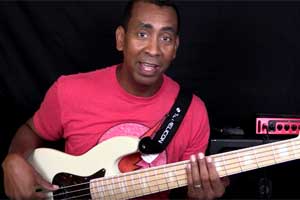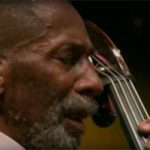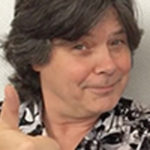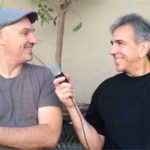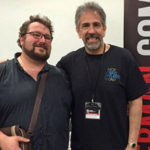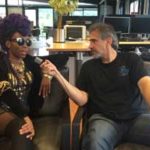Conversation with “Rapper’s Delight” bassist on playing with the greats and scoring for HBO films
Exclusive interview with FBPO’s Jon Liebman
April 21, 2014
A native of North Carolina, Chip Shearin is an acclaimed bassist, producer and composer. He has performed and/or recorded with a veritable who’s who of music icons, including jazz greats Donald Byrd and Dizzy Gillespie, soul icons Aretha Franklin and Gladys Knight, rap artists Grandmaster Flash and Tupac and contemporary pop stars Christina Aguilera and CeeLo Green.
Sherin’s bass can be heard on commercials for Ford, GM, Radio Shack and J.C. Penney, as well as TV shows on ABC, CBS, HBO and Fox. Chip’s career was jump-started when he laid down that iconic bass line for Sugar Hill Gang’s smash hit, “Rapper’s Delight.”
FBPO: How would you describe your musical upbringing?
CS: My musical upbringing started very early. My grandmother was a piano teacher and nobody escaped those lessons. From age 4, I was always around music, taking piano, reading music or just listening to her tell me about the lives of Bach, Mozart, Beethoven. I really thought it was all amazing at that age.
FBPO: How did you become a bass player?
CS: I started on guitar around 14. I thought it was an okay instrument. It didn’t really thrill me but, hey, it made me kinda cool in school, ya know! I had a close friend ask if I could play bass for him in a talent show. I didn’t have a bass, so the pawn shop was the first stop. The next stop was back to my friend’s house to figure out what to do with it, which turned out to be a blessing. His brother Al Kee, was the bassist for the Staple Singers at the time. My friend was a young John P Kee, who went on to a superstar career in gospel, winning a few Grammys. Al and John showed me things that have stuck with me throughout out my life. Needless to say, I dropped guitar and it was bass, 24/7!
FBPO: Who were your influences when you first discovered the bass?
CS: I grew up at an amazing time, musically. In my neighborhood alone, I was mentored by some monsters, like Al Kee, Aaron Mills, bassist for R&B group Cameo, and a host of other talented musicians. John was a strong piano player and had a wicked left hand. I spent hours picking up his approach. The great jazz trumpeter Donald Byrd was around too and spent a lot of time with me. It was heaven for me, growing up. I was very blessed having those mentors.
One of the first influences also was Ray Brown. I’d rush home from school to catch the Merv Griffin show because Ray was holding the bass chair down on national TV. It was church in there watching him! He did a duet with his ex-wife Ella Fitzgerald one afternoon and I knew from that day on I was a bass player. Following this with Stanley Clarke, Jaco, Al Johnson, Miroslav Vitous, Ron Carter, Larry Graham, Louis Johnson, Willie Weeks and of course James Jamerson. I would lock myself at home and practice till my fingers bled. True story!
FBPO: Your career kicked off at a pretty young age. Tell me the “Rapper’s Delight” story.
CS: After high school, I had to make the decision what to do next. I was accepted to Duke University, but wanted to hang out the summer before the fall semester. I took a suggestion from a friend and headed to New Jersey. While in Englewood, I was informed about this lady who had a studio that may have some recording work, so I made my way to the studio, which was the home of Sugar Hill Records/All Platinum. At this point, they were known for a couple of R&B hits, most notably, the song “Pillow Talk” by studio owner Sylvia Robinson. Over a period of a couple days, they were recording all kinds of things.
It was fun just hanging out, hoping for an opportunity. And sure enough, that’s what happened. Sylvia asked me to humor her and play this bass line for fifteen minutes. I said, “Sure!” I can remember there was a clock in the studio. I tried not to watch it, but couldn’t help it. Trying to stay connected and lock the tempo for fifteen minutes was a challenge, but we pulled it off, first take. Because there weren’t samplers in those days, it never crossed our minds what we were doing was special. Oddly, we never knew what it was being used for until after the session. I can remember Ms. Robinson telling us that she had three guys that were going to “talk real fast” over the track. They would rap. I remember almost saying, “Good luck with that!” [Laughs].
The first time I heard the record was about a month later. I had made my way back to start school and can remember hearing it being blasted from a dorm window while I was walking to class. I was shocked, to say the least. I couldn’t believe what I was hearing! The surprise of hearing yourself recorded was amazing, but witnessing first-hand a new style of music was mind blowing. I really couldn’t wrap my head around it.
FBPO: It looks like things really started happening for you after that. What kind of work were you doing, initially?
CS: Before that summer visit, I was doing the Top 40 bands, performing with piano Great Mary Lou Williams, Dizzy Gillespie and playing in the youth symphony. I was also attending every concert I could, including sneaking into sound checks to hear Jaco play. He spotted me a couple times and was always cool. He wouldn’t call security on me. I can remember he took me and my college roomy to this bar next door. He busts into the room and says, “I’m the greatest bass player on earth and I want to be treated as such!” I had no idea what to say to this, but he’d explain that he hated the title. He hated the attention, but I swear he had so much swag on stage. Whew! That mixture between chops and entertainment was amazing! Another monster lesson.
FBPO: What’s keeping you busy these days?
CS: These days, I’m busy with so many directions, musically and businesswise. Musically, I just completed a solo project and I’m very proud of it that. It has a who’s who of friends giving to the cause. I’m on tour with Marion Meadows, Paul Tayor, Warren Hill and Vince Ingala, with a tour called Sax in the City. Really popular tour. I’m producing about seven artists, with styles ranging from rock to country to jazz and funk. I do quite a few jingles too, for Ford, Sears, JC Penney, Mac Cosmetics, Waterpik, Mercedes Benz, McDonald’s. I’m also film scoring for HBO documentaries, Daddy Day Camp, Blade Trilogy, Iron Man and TV Pilots for Kelsey Grammer. Lately, I’ve increased my lecturing on the college level on the business of music.
FBPO: What kind of equipment are you using?
CS: I’m using TC Electronic amplification. This amp blew my head open with its abilities. I use quite a few MXR pedals, from the Bass Compressor, Envelope, Octave. Killer stuff! I use some Tone Prints pedals as well. Very flexible and easy to control. Jeri Hart Straps, Gator Cases on the road always. DR strings for solo work and a killer new string coming from Dunlop called Super Brights.
FBPO: How about your Marleaux basses?
CS: Gerald Marleaux is a talented builder. We met about three years ago and came up with the idea of a signature bass utilizing my personal specs. The product so far has been very good. Hopefully, we can continue to advance it and hip more players to the instruments. His line of basses fits so many different styles, which is so important. Marleaux basses are all about function and feel. They do an incredible job of getting those elements to work together.
FBPO: How about the future? What else would you like to do that you haven’t already accomplished?
CS: The future will be crazy busy. I’ve really been pushing to be as wide in scope as possible, musically and in my business approaches. If I could show every musician how to triple their income, do you think they would be interested? Well, that’s just a few months away. Sugar Hill was a long time ago.
FBPO: What would you be if you weren’t a bass player?
CS: Dr J!
